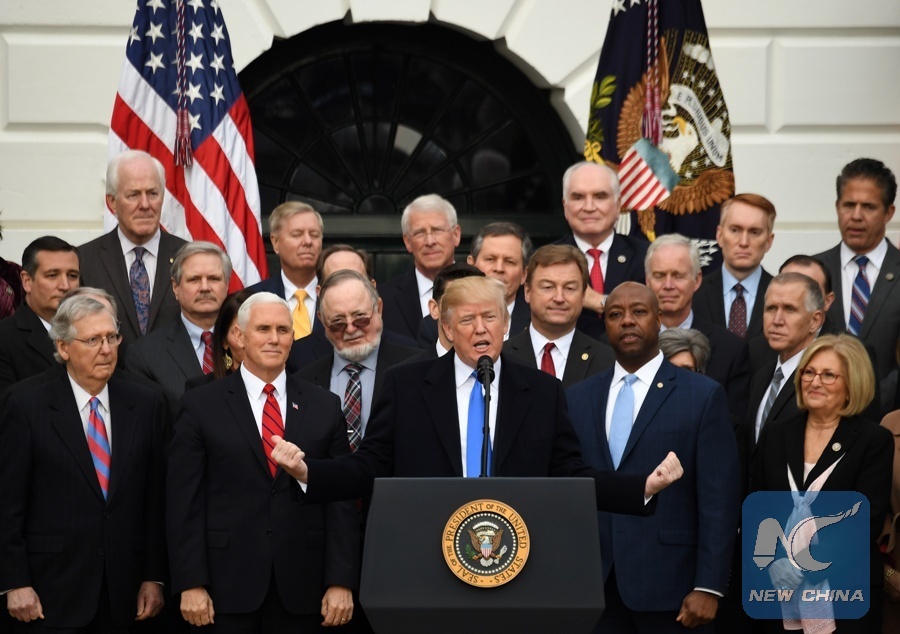
U.S. President Donald Trump (C) speaks at an event celebrating the passage of the tax bill on the South Lawn of the White House in Washington D.C., the United States, on Dec. 20, 2017. (Xinhua/Yin Bogu)
by Matthew Rusling
WASHINGTON, Dec. 22 (Xinhua) -- The year 2018 is shaping up to be a tough year for Republicans. With President Donald Trump's popularity sinking, the terrain looks uncertain as the Republican Party, commonly known as GOP, heads toward next year's mid-term elections.
"2018 is shaping up as a difficult year for the Republican party. It already has lost a Senate seat in Alabama that has been reliably Republican for many years," Brookings Institution Senior Fellow Darrell West told Xinhua, referring to the recent loss of a GOP senate seat.
"Combined with Democratic gains ...it suggests the political terrain has shifted against the GOP," he added.
MUCH-NEEDED TAX WIN
The GOP-led Congress this week passed a sweeping 1.5-trillion-U.S.-dollar tax overhaul, which cuts taxes for corporations, small businesses and individuals. The bill amounts to the biggest tax revamp in three decades, and was a much-needed legislative win after Trump's earlier failure to pass a massive healthcare bill.
But experts said this triumph may be short-lived, as it remains unknown whether the GOP will continue to control Congress after next year's midterm elections.
"Trump is very unpopular in most parts of the country and is likely to be a drag on Republican candidates," West said of the 2018 Congressional elections.
"It will be hard for them to separate themselves from the chief executive as Democrats will turn them into Siamese twins with Trump," West said of Democrats' strategy of linking all GOP candidates to the White House.
"Even the passage of the tax cut may not change this problem, because public opinion is negative on the bill. Most see it as a giveaway to corporations and wealthy individuals and not one that will help the middle class," West said.
Dan Mahaffee, senior vice president and director of policy at the Center for the Study of Congress and the Presidency, told Xinhua: "It's not looking good for the GOP in 2018."
First, the party of the incumbent president has historically faced challenges during any president's first midterm election and often control of Congress changes hands at that point.
Second, recent elections in the states of New Jersey, Virginia, and Alabama have seen even moderate Republicans and conservatively-inclined, educated independents not backing the GOP, according to polls.
And third, the continued emphasis by some, including Trump, to focus solely on Trump's base, bodes ill for a party that sorely needs to expand its reach.
INFRASTRUCTURE OVERHAUL AHEAD
"If the GOP does lose Congress, President Trump will have to figure out how to build bridges with a Democratic Congress that will have a Democratic base that wants to see zero cooperation with the Trump administration," Mahaffee said.
Still, there may be a light at the end of the tunnel, as both parties agree that the nation is in need of a major infrastructure upgrade.
"The one issue where there is a possibility of bipartisan agreement is infrastructure repair. That long has been an issue Democrats have wanted to address. If Trump reaches out to Democrats, there is a chance of the two parties agreeing on that area," West said.
Indeed, Trump is expected to release the details of his massive infrastructure plan in January.
Trump vowed in his presidential election race that he would propose a 1-trillion-dollar infrastructure overhaul plan during his first three months in office, but the plan got held up amid efforts to pass a healthcare bill and this week's tax revamp.
Trump is expected to release a detailed plan for upgrading airports, roads, bridges infrastructure ahead of his State of the Union address, which is slated for Jan. 30, according to a Bloomberg report.
But with all the bitter partisan rivalry in Washington for nearly a decade now, Trump's chances of reaching across the aisle to Democrats may be slim, experts said.
"Infrastructure ... could be an area for cooperation, but it's such a politically toxic environment now for cooperation," Mahaffee said.
But at the same time, there are signs that Trump is trying to stave off a knock-down, drag-out fight between the two parties by attempting to cut a deal on infrastructure.
On Friday, Trump posted a message on social media platform Twitter that he was willing to work with the opposition.
"At some point, and for the good of the country, I predict we will start working with the Democrats in a Bipartisan fashion," Trump tweeted Friday morning.
"Infrastructure would be a perfect place to start. After having foolishly spent $7 trillion in the Middle East, it is time to start rebuilding our country!" the president wrote.
The Washington Post also reported Friday that GOP Senate Majority Leader Mitch McConnell is considering infrastructure overhaul as the next bill the GOP should work on, as it's an area on which both parties can agree.

